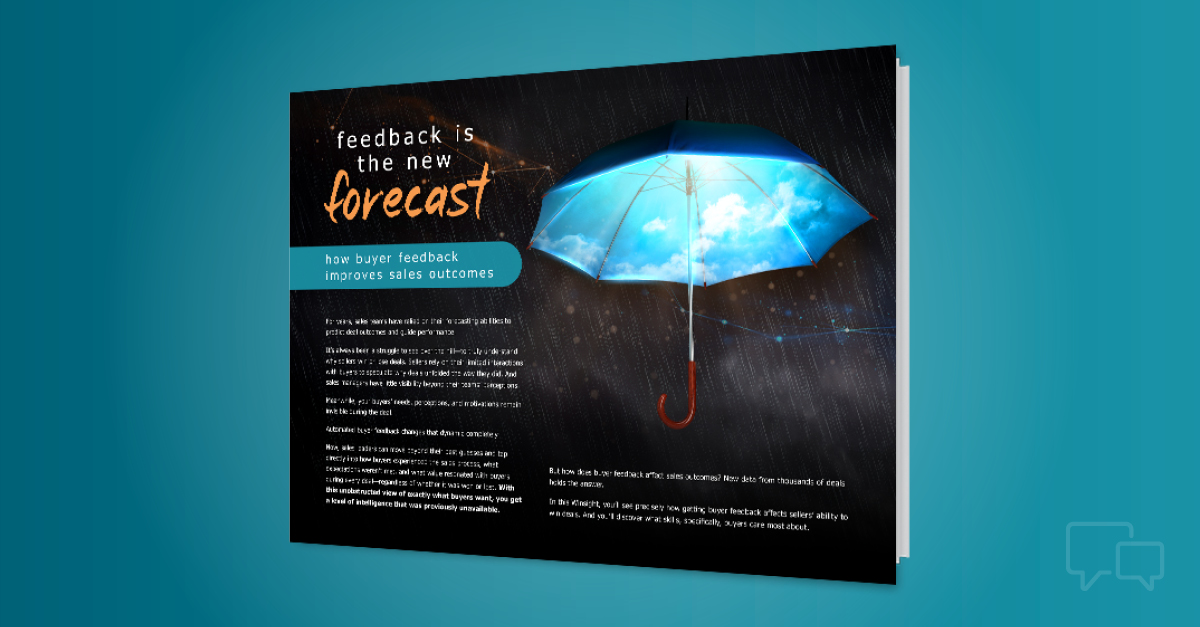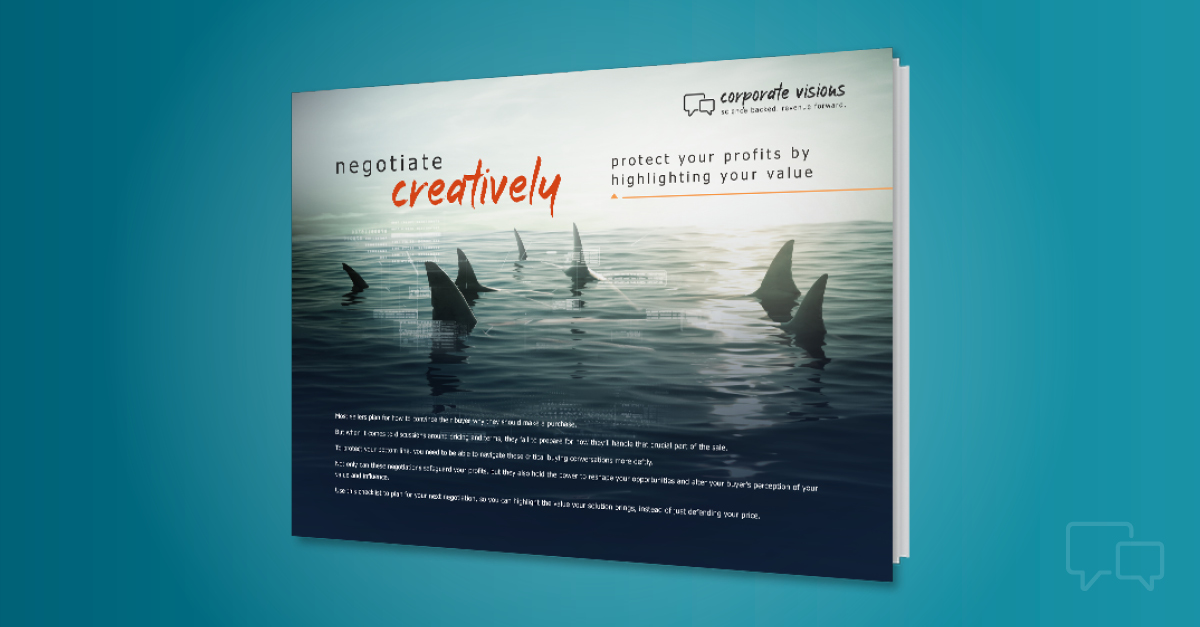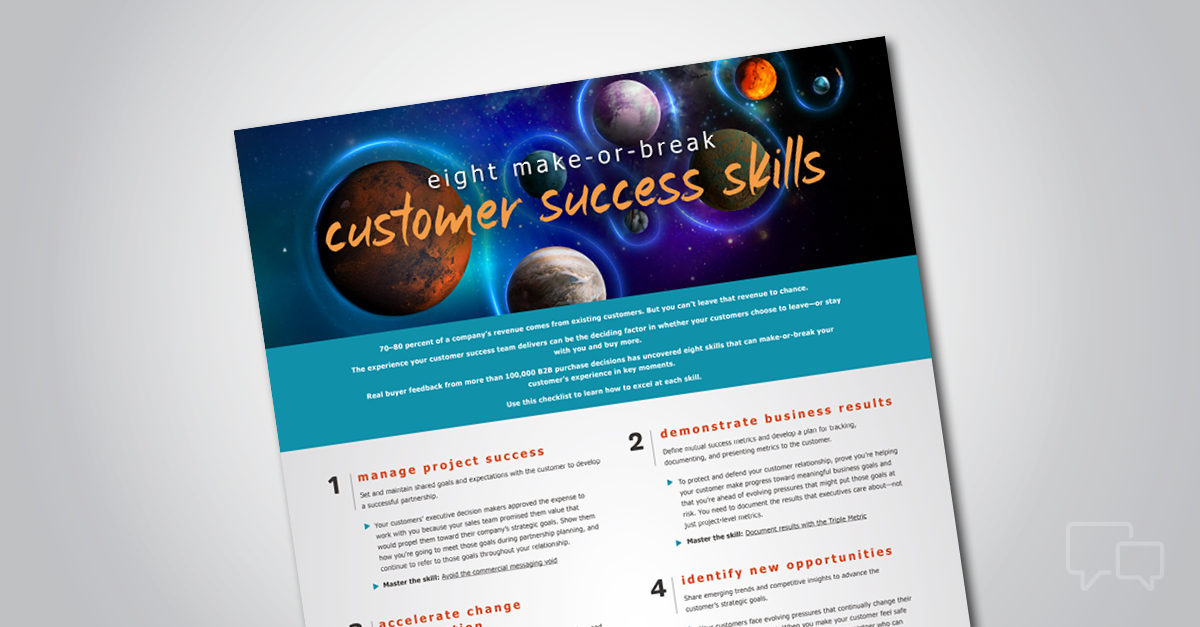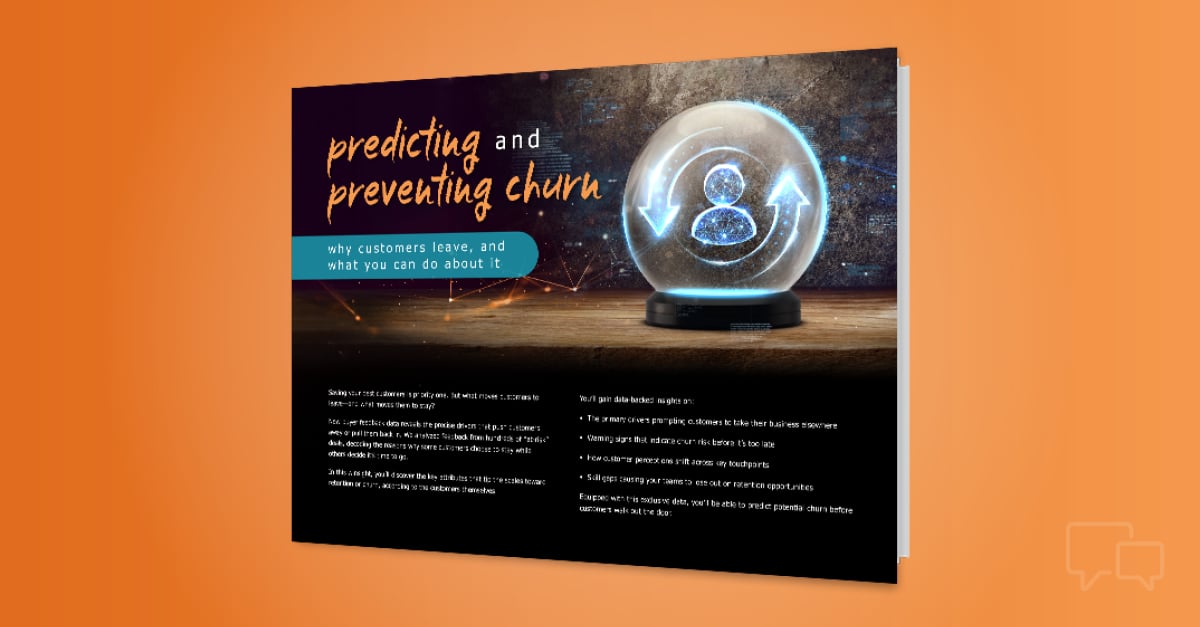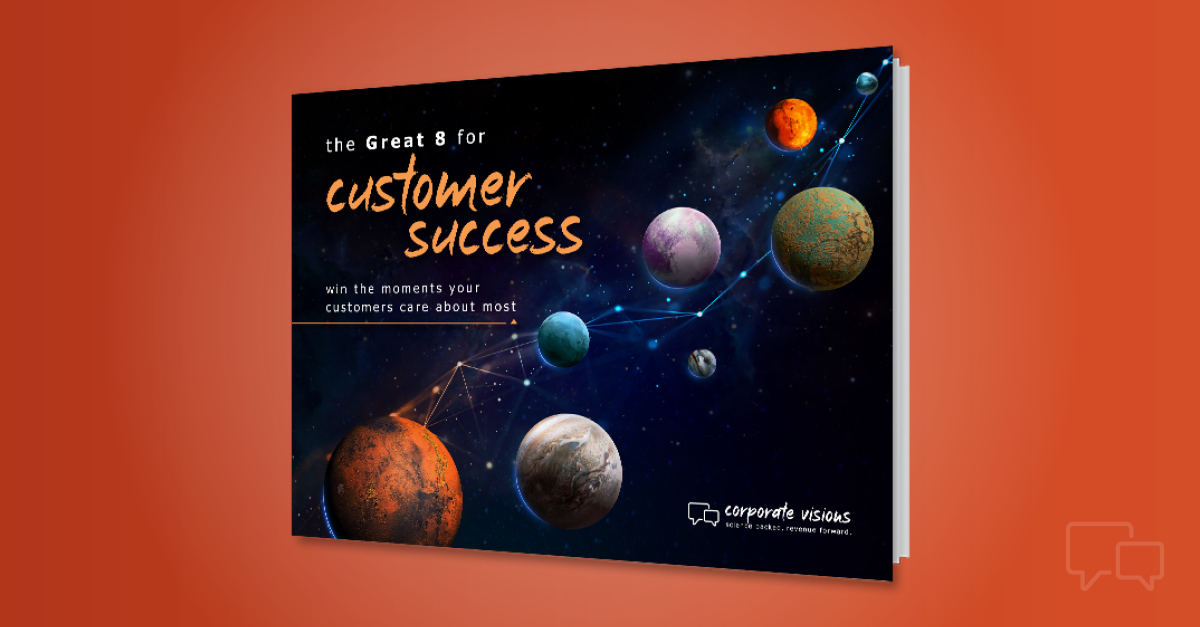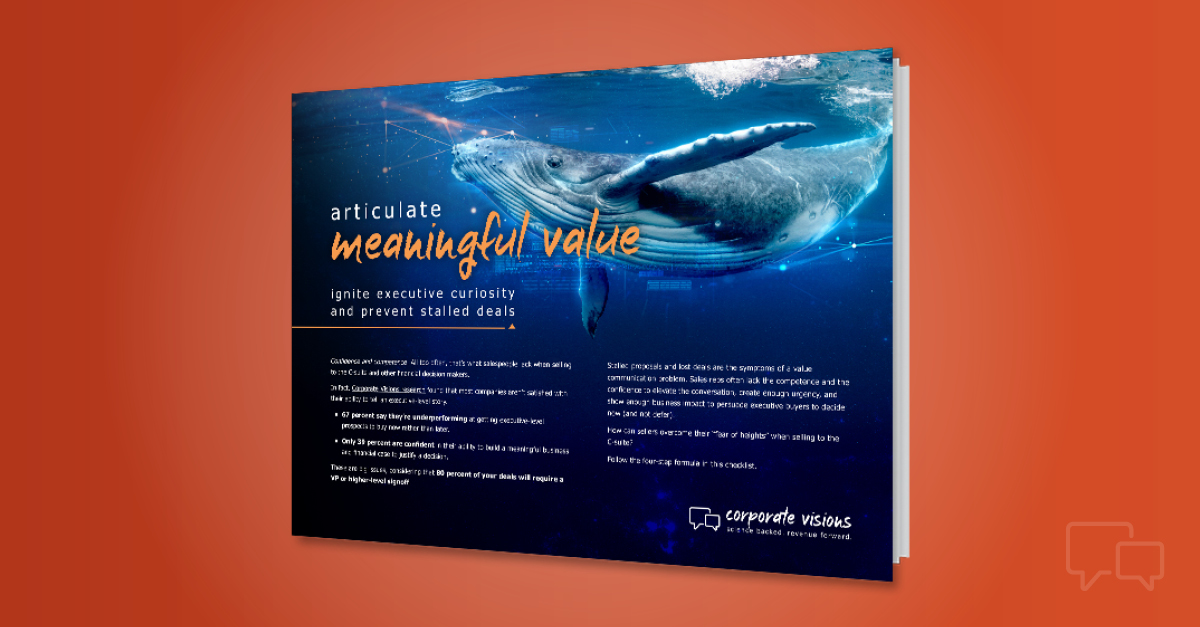Revenue Growth Strategy
-
 E-book: Bring Clarity to Your Revenue Growth Strategy
In this e-book, you'll learn how to execute your revenue growth strategy with clarity and confidence. Using science-backed techniques and psychological principles, you'll discover how to align your growth plays, growth levers, and revenue teams with the way buyers actually make decisions.
E-book: Bring Clarity to Your Revenue Growth Strategy
In this e-book, you'll learn how to execute your revenue growth strategy with clarity and confidence. Using science-backed techniques and psychological principles, you'll discover how to align your growth plays, growth levers, and revenue teams with the way buyers actually make decisions.
- Webinar Replay: Closing the Confidence Gap
- E-book: Win the Acquisition Growth Play
- E-book: Win the Expansion Growth Play
- Checklist: Three Areas to Identify for Your Revenue Growth Strategy
Essential Sales Skills
-
 E-book: Master the Great 8
In this e-book, you’ll learn about the eight most critical sales skills—according to buyers—uncovered from analyzing over 100,000 deals. Learn how to coach your sellers on these skills to truly make an impact and win more deals.
E-book: Master the Great 8
In this e-book, you’ll learn about the eight most critical sales skills—according to buyers—uncovered from analyzing over 100,000 deals. Learn how to coach your sellers on these skills to truly make an impact and win more deals.
- Webinar Replay: Mastering the Great 8 Sales Skills
- Checklist: Eight Make-or-Break Selling Skills
- Winsight: Sales Competencies That Count
Win-Loss Analysis
-
 E-book: Find and Fix Your Sellers’ Blind Spots
In this e-book, learn how to obtain real buyer feedback, provide customized coaching to your sellers, and monitor revenue performance for every rep and every deal.
E-book: Find and Fix Your Sellers’ Blind Spots
In this e-book, learn how to obtain real buyer feedback, provide customized coaching to your sellers, and monitor revenue performance for every rep and every deal.
- webinar replay: can customers coach your sales team?
- Winsight: Feedback Is the New Forecast
- Think Beyond NPS: Why Common Customer Experience Scores Fall Short
- Focused on Win-Loss or Win Rates?
Customer Acquisition
-
 E-book: Winning the Five Value Conversations
Buyers want you to sift through all the information that’s out there, then deliver insight into what they’re missing that will improve their performance. Get this e-book and discover the messages and skills your sellers need to win at every stage of the Customer Deciding Journey.
E-book: Winning the Five Value Conversations
Buyers want you to sift through all the information that’s out there, then deliver insight into what they’re missing that will improve their performance. Get this e-book and discover the messages and skills your sellers need to win at every stage of the Customer Deciding Journey.
- Webinar Replay: (Co-)Creating the Buying Vision for Change
- Defeat Your Prospect’s Status Quo with Unconsidered Needs
- What You Need to Know About the Challenger Sales Model
- Sales Strategy: What’s Most Effective? A Great Message!
Customer Expansion
-
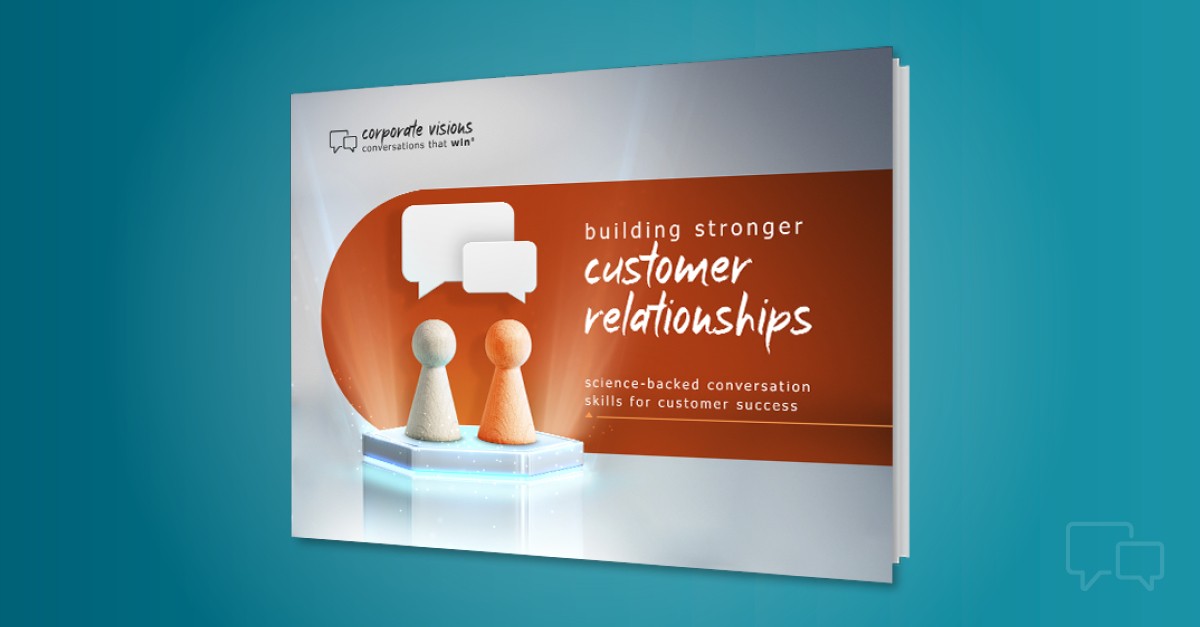 E-book: Building Stronger Customer Relationships
Most customer success conversations lose track of the metrics and goals that decision makers actually care about. In this e-book, you’ll learn customer success conversation skills grounded in Decision Science and research to build long-lasting, more profitable customer relationships.
E-book: Building Stronger Customer Relationships
Most customer success conversations lose track of the metrics and goals that decision makers actually care about. In this e-book, you’ll learn customer success conversation skills grounded in Decision Science and research to build long-lasting, more profitable customer relationships.
- Webinar Replay: The Expansion Sale
- How to Measure Results that Decision Makers Care About
- Avoid These Critical Mistakes in Your Quarterly Business Reviews
- The Best Way to Apologize to Customers, Backed by Science
Memorable Marketing
-
 E-book: Marketing for Buying Decisions
Buyers aren’t just talking to Sales to make decisions—they’re using digital content to learn and shop at their own pace. Marketers are also more involved in keeping and growing business with existing customers. Learn how you can adapt using four science-backed skills.
E-book: Marketing for Buying Decisions
Buyers aren’t just talking to Sales to make decisions—they’re using digital content to learn and shop at their own pace. Marketers are also more involved in keeping and growing business with existing customers. Learn how you can adapt using four science-backed skills.
- Webinar Replay: Four Key Marketing Skills to Drive Buying Decisions
- Webinar Replay: How to Make Marketing Memorable
- Marketing is Moving Further Down the Sales Funnel
- Why is Most B2B Marketing So Forgettable?
Win-Backs
-
 E-book: Using Behavioral Research to Win Back Lost Customers
Your once-loyal customer decided to leave. But does that mean it's over for good? Or could there be a way to win them back? Get this e-book to find out what kinds of messages will persuade your lost customers to return.
E-book: Using Behavioral Research to Win Back Lost Customers
Your once-loyal customer decided to leave. But does that mean it's over for good? Or could there be a way to win them back? Get this e-book to find out what kinds of messages will persuade your lost customers to return.
- Checklist: Three Ways to Win Back Lost Customers
- webinar replay: winning the win-back
- Webinar Replay: Why Return – New Research Reveals the Most Effective Win-Back Messages
Differentiation
-
 Webinar Replay: Avoid the Parity Trap
No one wants to believe your solutions are the same as your competitors. Yet, in well-defined categories, multiple companies can feasibly do the same job with similar capabilities and pricing. How do you avoid this parity trap and create the competitive separation you need to stand out?
Webinar Replay: Avoid the Parity Trap
No one wants to believe your solutions are the same as your competitors. Yet, in well-defined categories, multiple companies can feasibly do the same job with similar capabilities and pricing. How do you avoid this parity trap and create the competitive separation you need to stand out?
- Differentiation: Your Solution Story Checklist
- How to Create a Unique Value Proposition in a Crowded Market
- Sales Value Proposition: How to Build and Deliver a Powerful SVP
Digital Sales Transformation
-
 E-book: Digital Sales Transformation
In this e-book, you'll see how one Fortune 500 company moved from primarily field selling to a digital sales model and get science-backed tips for transitioning your organization.
E-book: Digital Sales Transformation
In this e-book, you'll see how one Fortune 500 company moved from primarily field selling to a digital sales model and get science-backed tips for transitioning your organization.
- Webinar Replay: Transform your Sales Strategy for Digital Success
- The Executive’s Guide to Digital Sales
- Scorecard: Assess Your Digital Selling Readiness
Executive Conversations
-
 Webinar Replay: Elevate Your Executive Conversations
Is the current economic climate freezing your sales? Learn how to thaw them out by warming up C-suite decision makers in this webinar with Jim Druckrey and Mark Chakravarty.
Webinar Replay: Elevate Your Executive Conversations
Is the current economic climate freezing your sales? Learn how to thaw them out by warming up C-suite decision makers in this webinar with Jim Druckrey and Mark Chakravarty.
- Webinar Replay: Toe to Toe with the CXO: Improve Your Executive Selling Conversations
- Webinar Replay: Gaining Executive Access—Why Your Traditional Approach Isn’t Working
- Selling to the C-Suite: How to Get Executive Decision Makers to Act Now
Remote Selling
-
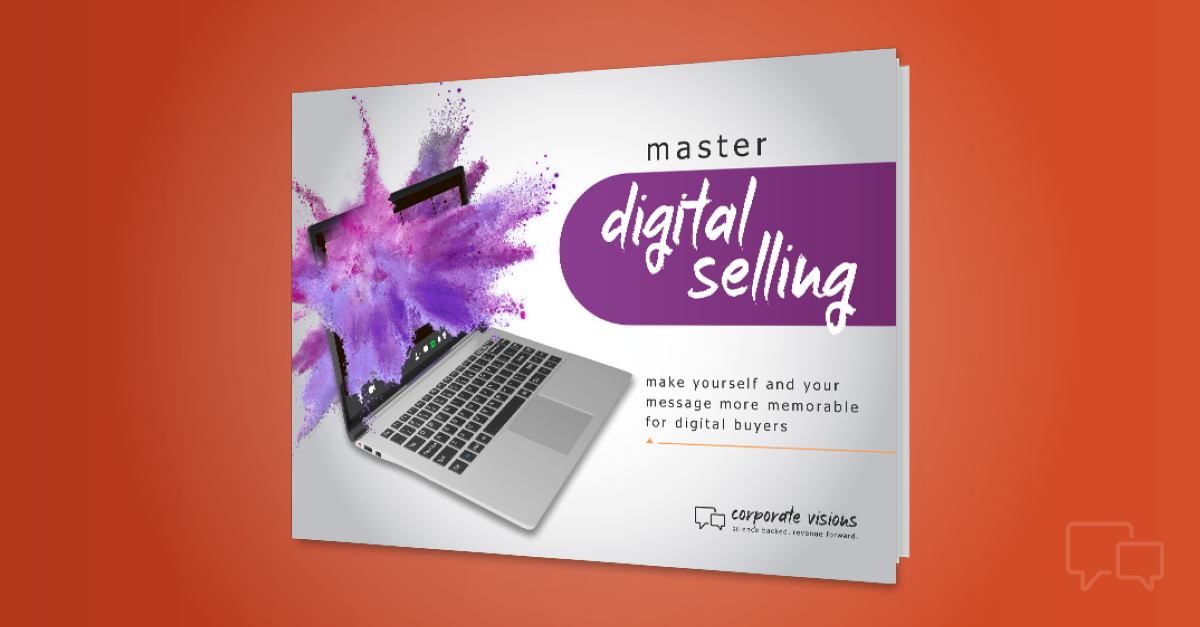 E-book: Master Digital Selling
In this e-book, you'll learn how to create more memorable digital buying experiences, lead higher-impact digital conversations, and drive more buying decisions in your favor.
E-book: Master Digital Selling
In this e-book, you'll learn how to create more memorable digital buying experiences, lead higher-impact digital conversations, and drive more buying decisions in your favor.
- Checklist: Nine Tips for Persuasive and Memorable Sales Presentations
- Remote Sales 101: Ten Easy Tips to Improve Your Online Meetings
- Virtual Selling Excellence: Essential Skills and Strategies for Sales Organizations to Thrive
- Make Virtual Sales Meetings More Engaging and Memorable
Situational Enablement
-
 E-book: Win the Moment with Situational Sales Enablement
You can’t plan for competitive moves, market changes, or global events, but they happen all the time. Discover a faster, more flexible approach to training and enablement—one that doesn’t depend on a long-term, “just-in-case” plan.
E-book: Win the Moment with Situational Sales Enablement
You can’t plan for competitive moves, market changes, or global events, but they happen all the time. Discover a faster, more flexible approach to training and enablement—one that doesn’t depend on a long-term, “just-in-case” plan.
- Webinar Replay: The Power of Rapid Response Situational Enablement
- The Three Waves of Sales Enablement
- Three Examples of Situational Enablement in Action
- Proving the Power of Situational Enablement

